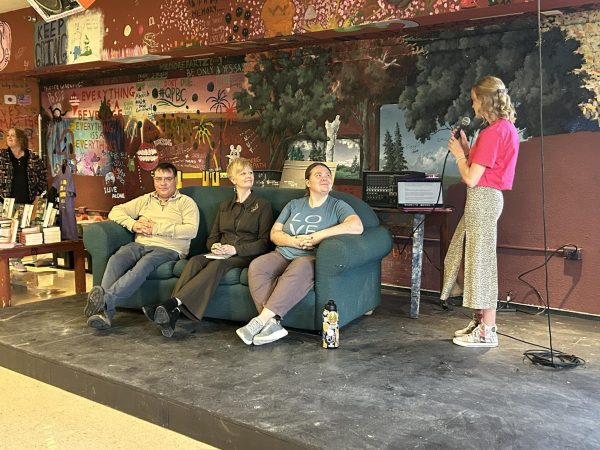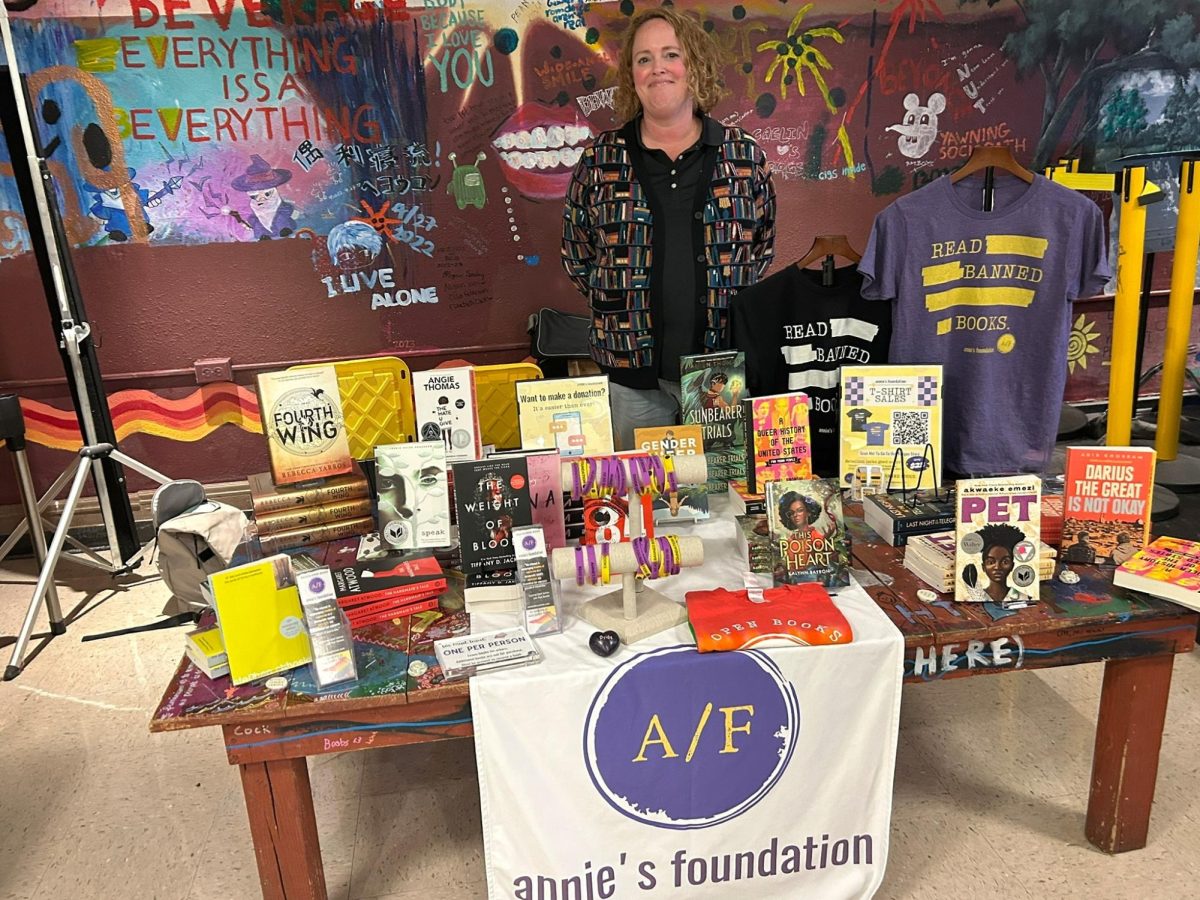Grinnell’s banned book club, Shelf Awareness, hosted a panel in Bob’s Underground on Wednesday, April 2, where Iowa educators discussed the impact of book bans under Senate File 496 and how communities can combat them.
Shelf Awareness president Abby Harris `28, wearing a bright pink shirt reading “Ban Bigots, Not Books,” said that the event grew from her passion for advocating against book banning and book challenges in schools. After panelists criticized the law firm Ahlers and Cooney P.C., which represents over 250 Iowa school districts, Harris said that she hoped to improve upon their work in her future career.
“I want to go into education, educational law specifically,” Harris said. “When they [the panelists] were getting into that conversation about the attorneys for the district, I want to be that and I want to do better. I wanted to burst the bubble that Grinnell students live in, of ‘We live in a liberal community.’ I wanted to expand their horizons.”

Sara Hayden Parris and Emily Harris `98 of Annie’s Foundation, a nonprofit that facilitates access for Iowans to banned and challenged books, brought over 150 books to the event and handed them out to attendees. Many of the books had been banned in Iowa public schools.
“Abby picked out a lot of them, like some of her favorites,” Hayden Parris said. “Right before Christmas, we got the Johnston book ban list … It’s interesting, because in Johnston, 48 percent of the books on the list have not been banned anywhere else in the country. We tried to bring some of those now to raise awareness.”
Passed in the Iowa legislature in May 2023, SF 496 forbids the use of non-“age-appropriate” material in school libraries and instructions, with a focus on books that include “sex acts.” On March 25, U.S. District Court Judge Stephen Locher reinstated a preliminary injunction on the law, pausing its enforcement.
Panelist Dan Gutmann, a former member of the Urbandale school board and now a fourth grade teacher in Des Moines, is a plaintiff in a lawsuit with Penguin Randomhouse challenging the constitutionality of SF 496.
“I was on the Urbandale school board when they banned 500 books initially, in the summer of 2022,” Gutmann said. “Our school board was not aware of that decision. I found out about that through the Des Moines Register and we had a community resistance develop. We applied some pressure to our Urbandale administration and ended up getting about 400 of those books reshelved at that time.”
Panelist Alyson Telford, a seventh grade English teacher in Norwalk and also a plaintiff in the lawsuit, said that she keeps 2,872 books with diverse content in her classroom, which she said positively impacts her students.
“At Norwalk, they told me that I’d have to remove all LGBT content from my classroom library, even though I taught seventh grade and the law applies to K-6 [kindergarten through sixth grade],” Telford said. “So I reached out to Dan and some lawyers for our union to try to figure out what my options were.”
Kristine Milburn, an English teacher and gifted and talented program lead for West Des Moines Community Schools, said that she helped her district develop a review process to deal with challenged and banned books under section 702.17 of the Iowa code, which contains the legal description of a sex act.
“We don’t pull books willy-nilly based on the list that somebody gives us,” Millburn said. “We examine every book and we make sure that if we’re going to pull it, it’s because of the law and not because of personal opinion.”
In addition to content restrictions from SF 496, the panelists discussed provisions of the law that mandate parental notification if students ask to be addressed by different names or pronouns than in the official records.
“I do want to mention the forced outing provisions and say I am okay going on record and saying I don’t follow that law,” Telford said during the panel. “I will not follow that law and I will use the pronouns my students prefer, regardless of what the state tells me to do.”
Attendees and panelists said that they worried about the erasure of non-white and LGBTQ+ identities with book bans.
“I’m gay and I’m married,” Gutmann said. “We have a son and I’d say my concern is, I feel like my community is being erased from our city … My son graduates next year, and I know we’re not the only same-sex couple families considering, how long do we stay and take it? Or at what point do we feel our family and community has been criminalized to a point where we just want to get out of here?”
Telford said she worried about burnout among educators that resist book bans.
“I’m most worried about people doing the good work getting tired and leaving and being replaced with people who are just going to do what they’re told,” Telford said. “I’m worried about the people who are willing to get some pushback, leaving for their own mental health.”
Kevin Hosbond, chair of the English department at Grinnell High School, who was embroiled in tensions over teaching “The Glass Castle” in his English class two years ago, said that book bans still pose a danger to the community.
“It just feels morally wrong, even though certain groups of people feel that some of the books are immoral,” Hosbond said. “It feels more criminal to take the rights of the community away. It erases a lot of people. It’s been scary.”
Hosbond said he appreciated the support of College students and faculty during the conflict over “The Glass Castle” at Grinnell High School.
“When we went through our book reconsideration a couple years ago, so many students and faculty showed up in support and they made speeches at meetings,” Hosbond said. “That was important, because the book made it through, but when the new law went into effect, we had to ban it anyway. But I still appreciate the gesture that was offered by so many people.”
The first book on the agenda for Shelf Awareness is “The Glass Castle.”



















































